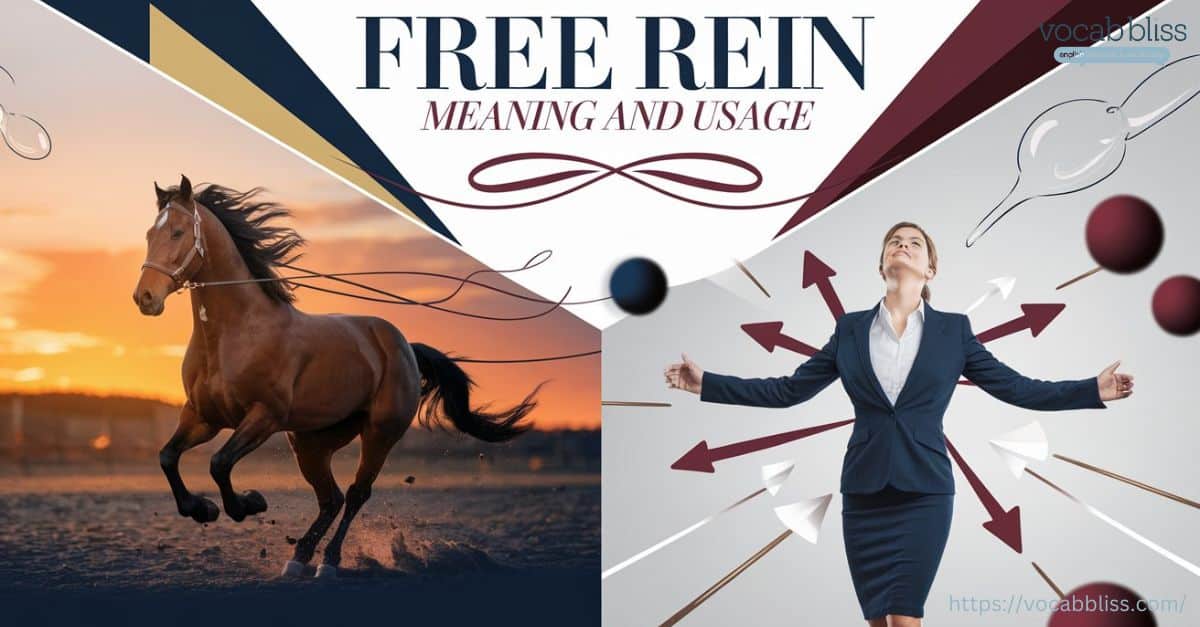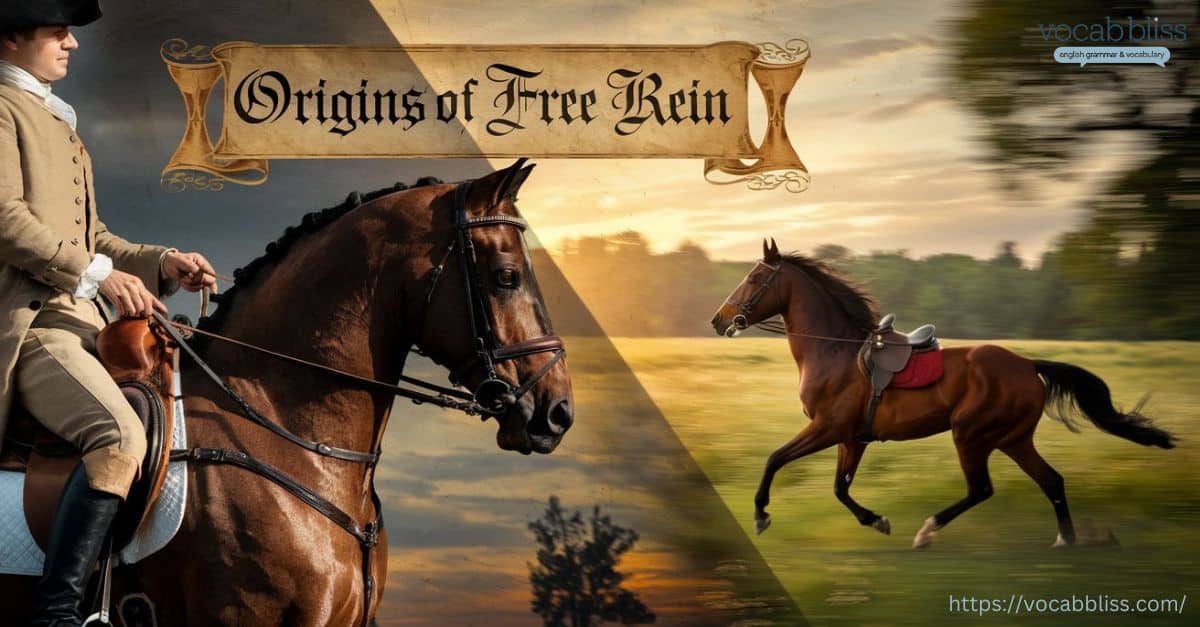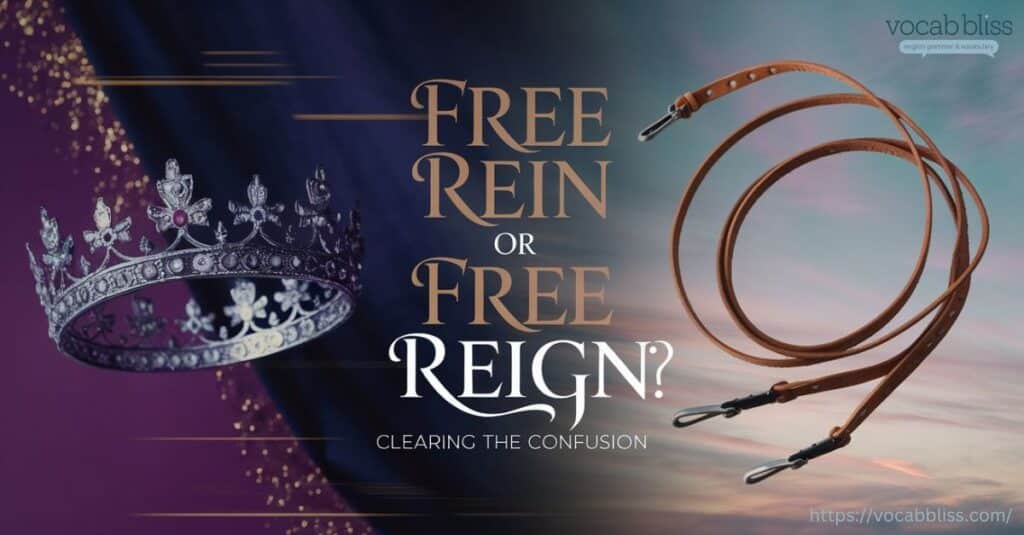Language is a living, breathing entity that evolves over time. However, some phrases get caught in the tangled web of misinterpretation. One such pair is “free rein or free reign”. While they sound similar, their meanings and origins are worlds apart.
In this article, we’ll dig deep into the difference between free rein and free reign, how to use them correctly, and why the confusion persists.
Quick Summary
The phrases free rein or free reign are often confused due to their similar pronunciation, but they have distinct meanings. “Free rein” is the correct expression, originating from horseback riding, where “rein” refers to the straps used to control a horse. When someone is given “free rein,” they are allowed to act freely without interference. On the other hand, “free reign” is a common but incorrect misuse, as “reign” refers to ruling or exercising control, making it an inappropriate choice when discussing freedom or autonomy. It’s crucial to use “free rein” in contexts where freedom, autonomy, or unrestricted action is being discussed. Additionally, phrases like “reins of power” are the correct metaphors for control or authority, not “reigns of power.” Understanding these differences will ensure clarity and precision in communication.
Read More: Hayday or Heyday: Which Term is Correct to Use?
Understanding Free Rein or Free Reign
The confusion between “free rein or free reign” arises from the fact that they are homophones—words that sound the same but have different meanings and spellings. This phonetic similarity often leads to misinterpretation, especially when people encounter the phrases in speech rather than writing. Let’s break down why this mix-up is so widespread.
Homophones and Why They Cause Confusion
The English language is full of homophones like “their” and “there” or “principal” and “principle.” These words rely on context for clarity, and “rein” and “reign” are no different.
- Rein: A strap used to control a horse, symbolizing guidance or freedom depending on its use.
- Reign: A term tied to monarchy or ruling, implying authority and dominance.
Because both terms are associated with control and autonomy in different ways, their meanings can overlap conceptually, making it easy to blur the lines between them.
For example:
- “He was given free rein” (Correct: Freedom to act)
- “He was given free reign” (Incorrect: Sounds logical, but the phrase doesn’t relate to ruling).
Misconceptions Fueled by Modern Usage
The rise of incorrect usage in popular culture and media has added to the confusion. Phrases like “free reign” may appear in blogs, social media posts, or even spoken dialogue, giving the false impression that both versions are interchangeable.
Cultural trends also play a role:
- Visual imagery: The idea of a ruler (reign) having unrestricted control feels intuitive, making “free reign” seem logical.
- Figurative usage: As phrases move away from their literal origins, people lose touch with the historical context. Few today associate “free rein” with horseback riding, which leads to misinterpretation.
The Key to Avoiding the Mix-Up
Understanding the etymology and context of each term is crucial. By remembering that “free rein” originates from horseback riding and focuses on freedom, while “reign” is tied to ruling authority, you can confidently use the correct phrase every time.
Free Reign Meaning and Usage
Definition of Reign
The term “reign” refers to the exercise of power, authority, or sovereignty, typically by a monarch or ruler. Derived from the Latin word regnum (meaning rule or kingdom), it conveys control over a territory or people.
Examples of Reign in Context:
- “The king’s reign lasted for over three decades.”
- “Her reign as queen was marked by peace and prosperity.”
- “During his reign, innovation and reform flourished.”
“Reign” is always tied to the concept of governance, oversight, or dominance. It emphasizes the idea of being in charge and wielding authority, often in a formal or structured context.
Why Free Reign Is a Common but Incorrect Usage
Despite its logical-sounding nature, “free reign” is an incorrect phrase. The error arises from a misunderstanding of the idiomatic expression “free rein,” which means granting someone the freedom to act without restriction.
Reasons Behind the Mix-Up:
- Sound-Alike Words: “Rein” and “reign” are homophones, leading many to confuse the two in speech and writing.
- Assumed Meaning: Since “reign” implies ruling or authority, people mistakenly think “free reign” means unrestricted authority or control, which aligns with the concept of freedom.
- Cultural Shifts: As fewer people are exposed to the origins of “free rein” in horseback riding, the connection between reins and freedom has faded, giving way to modern assumptions.
Why It’s Incorrect:
- “Reign” denotes authority and control, whereas the idiom “free rein” stems from the literal act of loosening the reins on a horse to allow it freedom of movement.
- The term “free rein” emphasizes the absence of oversight or direction, making “reign” an unsuitable substitution.
Examples of Misuse in Everyday Writing or Speech
Common Missteps:
- Incorrect: “The CEO gave her team free reign to develop the product as they wished.”
- Correct: “The CEO gave her team free rein to develop the product as they wished.”
- Incorrect: “Parents should give their children free reign to explore their creativity.”
- Correct: “Parents should give their children free rein to explore their creativity.”
- Incorrect: “The artist was given free reign over the mural’s design.”
- Correct: “The artist was given free rein over the mural’s design.”
Why Precision Matters
Although “free reign” is a common error, using the correct term “free rein” demonstrates attention to detail and linguistic accuracy. It preserves the historical roots of the phrase while avoiding miscommunication. Understanding and applying the right phrase ensures that your writing is both professional and precise.
Free Rein Meaning and Usage

Definition of Rein and Its Connection to Controlling a Horse
The word “rein” refers to a narrow strap attached to a horse’s bridle, used by the rider to control the animal’s movement. By pulling or loosening the reins, the rider can direct the horse to stop, turn, or move forward.
The phrase “free rein” originates from this equestrian context. When a rider gives a horse “free rein,” they loosen the reins, allowing the animal to move freely without guidance or restriction. This literal practice of relinquishing control evolved into a metaphor for granting someone freedom or autonomy.
Correct Usage of Free Rein as the Freedom to Act or Decide
“Free rein” is used to describe situations where a person or group is allowed to act independently, without interference or oversight. It implies trust and confidence in the decision-making abilities of the individual granted this freedom.
Examples of Correct Usage:
- “The teacher gave her students free rein to choose their research topics.”
- “He was given free rein to restructure the company’s policies.”
- “The director allowed the actor free rein to interpret the character.”
These examples illustrate how the phrase emphasizes autonomy, particularly in contexts requiring creativity, leadership, or independent thinking.
How This Phrase Conveys Autonomy or Lack of Restrictions
The imagery behind “free rein” perfectly captures the idea of freedom: just as a horse moves freely when the reins are slackened, people with “free rein” are unrestricted in their choices or actions. This phrase underscores the absence of control while highlighting trust.
Key Characteristics of “Free Rein”:
- Independence: It signifies autonomy in decision-making.
- Example: “The CEO gave the team free rein to develop the product as they saw fit.”
- Unrestricted creativity: Often used in creative or professional settings where innovation thrives without micromanagement.
- Example: “The artist had free rein to design the gallery exhibit.”
- Trust: The person granting “free rein” places confidence in the other’s abilities.
Why It Matters:
Using “free rein” accurately conveys an understanding of its historical context and its metaphorical meaning of liberty. It’s a subtle but significant way to communicate precision in both writing and speech.
Origins of Free Rein

Historical Context: Origin in Equestrian Terminology
The phrase “free rein” has its roots firmly planted in the world of horseback riding. In equestrian terminology, a “rein” refers to the straps attached to a horse’s bridle, which the rider uses to steer and control the animal.
When a rider gives a horse “free rein,” they loosen their grip on the reins, allowing the horse to move freely without direction. This act symbolizes trust in the horse’s instincts and decisions, as the rider temporarily relinquishes control. The phrase captures the balance between control and freedom, where the horse is metaphorically “let loose” to choose its path.
When and How the Phrase Entered the English Lexicon
The term “free rein” began appearing in the English language in the early 17th century. As horseback riding was a central mode of transportation and communication, equestrian terms naturally found their way into everyday speech and writing. The phrase initially maintained its literal meaning but quickly took on a figurative sense as a metaphor for granting freedom or autonomy.
Early Usage in Literature:
- 1630s: The phrase began to appear in English texts, describing situations where freedom or lack of restriction was given.
- 18th and 19th centuries: Writers used “free rein” metaphorically to discuss political, creative, and personal autonomy.
For example, the poet John Dryden used equestrian imagery in his works, illustrating the widespread familiarity with horseback-related phrases during that time.
Evolution of the Phrase in Modern Language
As society moved away from horseback riding as a common practice, the literal meaning of “free rein” became less relevant to daily life. However, its figurative use gained traction, becoming a popular idiom to describe:
- Creative freedom (“The artist was given free rein to design the project.”).
- Professional independence (“The manager allowed her team free rein on the new campaign.”).
- Personal autonomy (“He was given free rein to handle the situation as he saw fit.”).
Modern Misunderstanding:
In contemporary language, the decline of equestrian culture has led to confusion between “free rein” and “free reign.” Many people mistakenly assume that “reign,” associated with ruling or authority, is the correct term. This confusion reflects how idiomatic phrases can evolve—and sometimes lose their historical context—over time.
Fun Fact:
Equestrian terms like “hold your horses” and “on the right track” share similar origins, further demonstrating how horseback riding has influenced the English language.
Free Rein Synonyms
If you’re looking to vary your vocabulary, here are some alternatives to “free rein”:
- Carte blanche: Complete freedom to act as one wishes.
- Unrestricted liberty: Freedom without limitations.
- Full autonomy: The ability to act independently.
Subtle Differences:
While these phrases align with the idea of “free rein,” they might carry slight variations in tone or context. Always consider the audience and purpose when choosing synonyms.
How to Use Free Rein in a Sentence
Using “free rein” correctly can elevate your writing. Here are a few tips and examples:
- Professional context: “The CEO gave the marketing team free rein to execute their campaign.”
- Creative context: “Writers often need free rein to explore their ideas.”
- Everyday conversation: “I gave my kids free rein to decorate their rooms.”

Common Mistakes:
- Misusing “free reign” in place of “free rein.”
- Overcomplicating sentences. Keep it simple and direct.
Side-by-Side Comparison free reign or free rein
Here’s a quick comparison of “rein or reign” to clarify their differences in meaning, usage, and context. This will help you remember when to use each term correctly.
Definition: Rein vs Reign
| Aspect | Rein | Reign |
|---|---|---|
| Definition | A strap used to control a horse’s direction, symbolizing freedom or control. | The period during which a monarch rules or governs, symbolizing authority and dominance. |
| Origin | Equestrian terminology—related to horseback riding. | Derived from regnum (Latin for “rule”)—associated with ruling or sovereignty. |
| Metaphorical Meaning | Freedom to act without restriction. | Authority to govern or rule over others. |
Usage: Correct vs Incorrect Phrase
| Phrase | Correct Usage | Incorrect Usage |
|---|---|---|
| Free Rein | “He was given free rein to make his own decisions.” | “He was given free rein to rule the company.” |
| Free Reign | “The artist was allowed free rein over the exhibit design.” | “She was given free reign to make the decisions.” |
Contexts Where Each Word Applies
| Context | “Rein” | “Reign” |
|---|---|---|
| Horseback Riding | The rider loosens the rein to allow the horse to move freely. | Not applicable in this context—reign does not relate to horseback riding. |
| Autonomy/Creativity | “She was given free rein to express herself through art.” | Incorrect—reign does not convey freedom. |
| Ruling/Authority | Not applicable—rein is not used in the context of ruling. | “The king’s reign was marked by stability and peace.” |
| Leadership/Management | “The CEO gave the team free rein to implement their ideas.” | Incorrect—reign would suggest control or dominance in this context. |
Quick Reference
- “Free rein” = freedom, autonomy, lack of restrictions (e.g., letting someone make decisions or act independently).
- “Reign” = sovereignty, authority, control (e.g., ruling a kingdom or organization).
Everyday Usage Examples free reign or rein
Let’s look at some real-life scenarios to clarify the usage:
- Correct (free rein): “The director gave free rein to the creative team, resulting in a masterpiece.”
- Incorrect (free reign): “The director gave free reign to the creative team.”
Pro Tip: If the sentence implies freedom without interference, “free rein” is the correct choice.
Conclusion
The difference between free rein or free reign boils down to their origins and meanings. While “free rein” symbolizes autonomy and liberty, “free reign” is a common error rooted in misunderstanding. By understanding the phrase’s equestrian history and practicing correct usage, you can avoid this linguistic pitfall.
Remember: Free rein meaning stems from horseback riding, while “reign vs rein” showcases how context shapes language.
FAQs About free reign or free rein
- Is it rein or reign?
The correct phrase is “rein” (as in “free rein” meaning freedom to act).
- Is it free range or free rein?
The correct term is “free rein”, not “free range”.
- What does give you free rein mean?
It means giving someone the freedom to act or decide without restrictions.
- What does it mean to allow free rein?
To allow free rein means to give someone the freedom to make decisions independently.
- What is the meaning of free reign?
Free reign is an incorrect term; the correct phrase is “free rein” meaning freedom to act.
- Is it reins of power or reigns of power?
The correct term is “reins of power”, referring to control or authority.
- What’s the difference between reign and rein?
“Reign” refers to ruling or authority, while “rein” refers to control (as in horseback riding) or freedom.
Continue reading:
- In Person or In-Person: When and Which Should You Use?
- Allude vs Elude: How and where to Use?
- Brake vs Break: The Ultimate Word Battle
- Layed or Laid: Which Is Correct?

Jorge Phillips is an experienced blogger who writes for Vocab Bliss, sharing his passion for the English language. With a knack for simplifying complex grammar rules and a focus on commonly confused words, Jorge helps readers navigate the nuances of English with ease. His insights aim to make learning engaging and practical.







